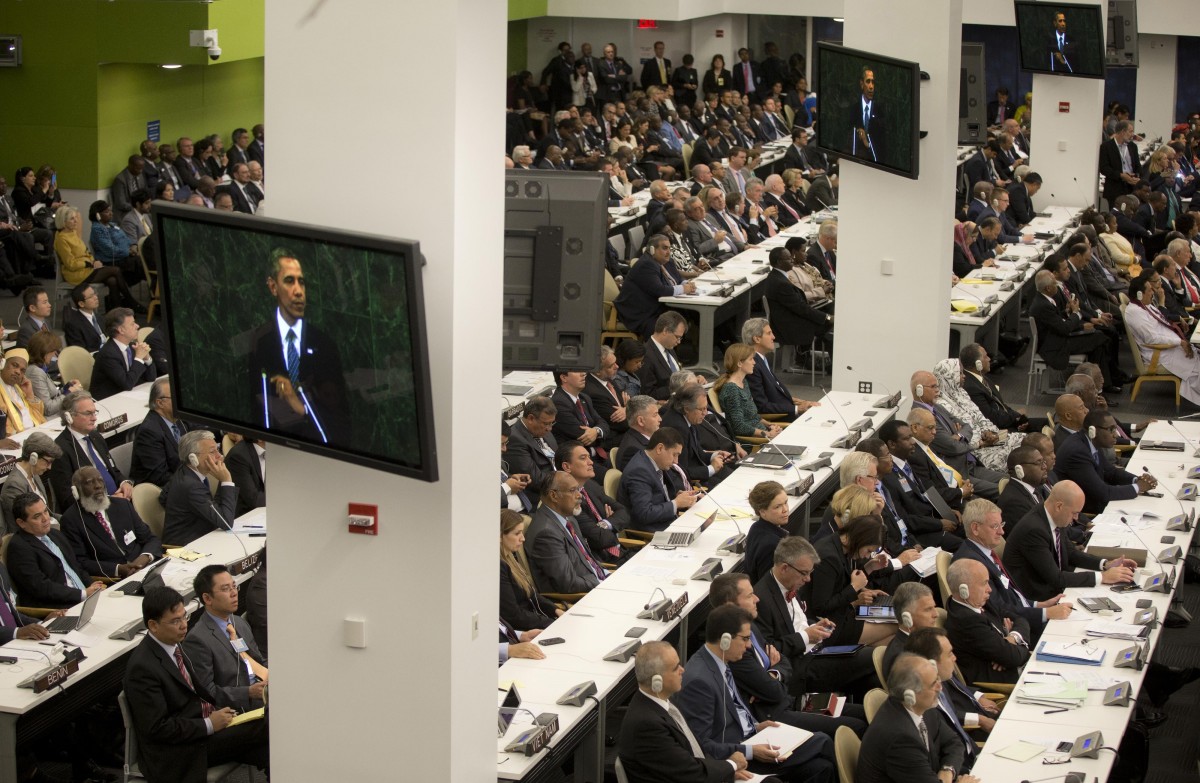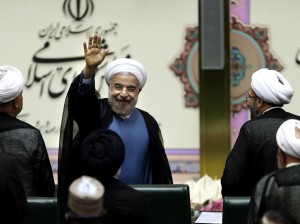
BUZZARDS BAY, Mass. — It happens every year: leaders convene in New York to pay homage to an organization that’s still struggling, after 68 years, to demonstrate its relevance in an increasingly complicated world.
“Let us empower the United Nations to be more than a first responder or a last resort,” UN Secretary General Ban Ki-moon said, opening the session Tuesday morning.
It was not the last bit of UN navel-gazing that day.
US President Barack Obama, embattled at home by fights over health care and arguably weakened abroad by the spying scandal as well as the wrangling over Syria, sounded a defiant note.
“The question is whether we possess the wisdom and the courage as nation states and members of an international community to squarely meet … challenges, whether the United Nations can meet the test of our time,” he said.
Judging by the rest of his speech, the US president has not yet reached any conclusions on the issue.
Washington made no secret of the fact that it’s willing to dispense with a UN mandate on Syria if the international community does not step up to punish President Bashar al-Assad for his forces’ alleged use of chemical weapons against his population on Aug. 21. Obama defended this approach.
“I know that in the immediate aftermath of the attack there were those who questioned the legitimacy of even a limited strike in the absence of a clear mandate from the Security Council,” he said. “But without a credible military threat, the Security Council had demonstrated no inclination to act at all.”
And if the UN fails to agree on a resolution to punish Syria if it doesn’t fulfill its obligations to hand over its chemical weapons, then the international organization will have shown that it has very little efficacy in today’s world, he said.
“If we cannot agree even on this, then it will show that the United Nations is incapable of enforcing the most basic of international laws,” Obama said.
In the absence of a strong and vigorous international body, the United States must continue to shoulder its burden, he said. But America’s patience is finite, he warned.
“The danger for the world is, that the United States after a decade of war … may disengage, creating a vacuum of leadership that no other nation is ready to fill,” Obama said.
This would be unfortunate for everybody, he insisted.
“I believe America must remain engaged for our own security, but I also believe the world is better for it … I believe America is exceptional. In part because we have shown a willingness through the sacrifice of blood and treasure to stand up not only for our own narrow self interest, but for the interest of all.”
Nationalistic rhetoric may play well at home, but it does not make the US popular abroad.
Spies like US
Obama’s speech directly followed that of Brazilian President Dilma Rousseff, who used her time to blast Washington over the spying program exposed by National Security Agency leaker Edward Snowden.
Some of Snowden’s latest leaks allege the US government snooped on countless Brazilians, including President Rousseff, prompting her last week to call off a planned state visit to the White House.
Speaking to the UN Tuesday, she said revelations of America’s global espionage “have caused indignation and repudiation in public opinion around the world.”
“Tampering in such a manner in the affairs of other countries is a breach of international law,” Rousseff added. “The arguments that the illegal interception of information and data aims at protecting nations against terrorism cannot be sustained.”
But the US president was uncompromising in his response. While acknowledging “legitimate concerns,” he merely promised to keep this in mind.
“We’ve begun to review the way that we gather intelligence so that we properly balance the legitimate security concerns of our citizens and allies with the privacy concerns that all people share,” he said.
Tepid Iran opening
As expected, Obama outlined an opening toward Iran, saying he had directed Secretary of State John Kerry to work with Tehran to explore the possibilities for closer cooperation.
The United States will never allow Iran to develop nuclear weapons, he emphasized, but Washington’s willing to help Iran break out of its isolation should its new, more moderate rhetoric be borne out by concrete action.
But the chief executive was careful not to sound too optimistic. Perhaps mindful of the conservatives at home who oppose any opening to Tehran, he sounded a cautious note. He acknowledged that the hostility and suspicion between Washington and Tehran have “deep roots,” and warned that “roadblocks may prove to be too great” to overcome.

There had been widespread speculation that Obama might meet with the Iranian president, Hassan Rouhani, on the margins of the UN General Assembly. It would have been the first meeting between leaders of the two countries since 1977.
When no sit-down session appeared on their schedule, pundits spent days predicting the two men might “accidentally” run into each other and exchange greetings or even a handshake. But officials made clear that this, too, was a non-starter, saying a meeting “was too complicated” for the Iranians.
Rouhani’s speech was eagerly anticipated as part of the Iranian leader’s “charm offensive,” which included his administration’s energetic use of Twitter, a privilege not accorded to Iranian citizens. Social media has been blocked there — except last week’s apparent brief glitch — since mass protests following a disputed presidential election in 2009.
Pundits have called Iran’s president a refreshing departure from his predecessor, Mahmoud Ahmadinejad.
When one is measuring moderation against a fiery leader who denied the Holocaust and may or may not have recommended wiping Israel off the map, charm has a pretty low threshold.
But Rouhani served up a healthy dose of criticism as well, hinting that he’s troubled by America’s insistence on its own exceptionalism.
He assailed “the persistence of Cold War mentality and bipolar division of the world into ‘superior us’ and ‘inferior others,’” which made the pursuit of peace all but impossible.
Rouhani, speaking through an interpreter, repeatedly emphasized that Iran poses no threat to the world and its nuclear program is entirely peaceful.
According to Rouhani, an “imaginary Iranian threat” has been used to justify a long list of crimes and catastrophes, which included “the arming of the Saddam Hussein regime with chemical weapons and supporting the Taliban and Al Qaeda.”
Iran, he said, “seeks to resolve problems, not to create them.”
This did not convince some conservative lawmakers in Washington.
“Horse pucky,” was how Michigan Republican lawmaker Mike Rogers, chairman of the House Intelligence Committee, reacted on CNN to Rouhani’s speech.
No news on Syria
Kerry met with his Russian counterpart, Foreign Minister Sergei Lavrov, Tuesday afternoon to hammer out details of an agreement reached two weeks ago on Syria.
The last-minute diplomatic move to avoid a military strike provides for Syria’s chemical weapons stores to be listed, secured, and destroyed, all within less than a year.
No announcements came out of the meeting, which Kerry deemed “very constructive” and Lavrov called “productive.”
The United Nations continues its session this week, with more speeches and more meetings, but the main non-event — the non-meeting between Obama and Rouhani — has already not taken place.
What more can one expect?
This article originally appeared on GlobalPost.

